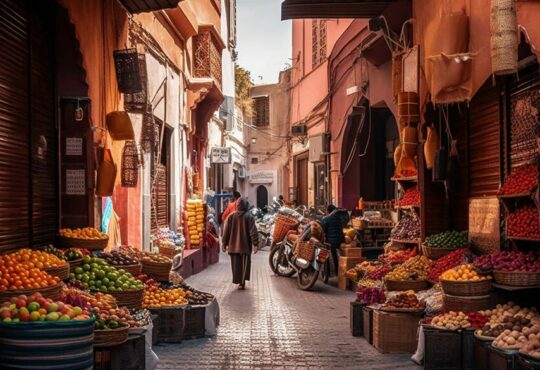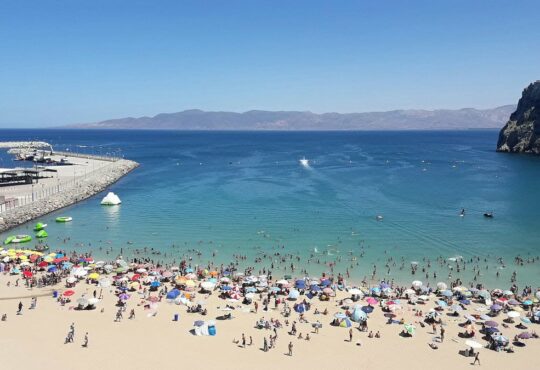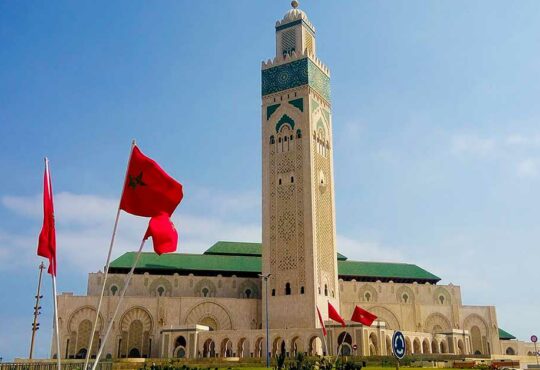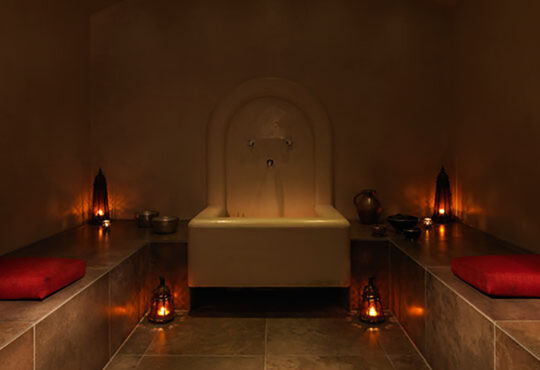2.8K
Yes, gift shopping! It is one of the most important things you think about when planning to visit another country, especially Morocco. You start researching and looking for information about the country and what it’s known for, and at some point, you wish you knew a local person from that country to give you advice about gifts to buy from Morocco and how to have the best shopping experience.
As a Moroccan girl that likes shopping and bargaining, I wrote this gifts shopping guide which will give you a clear idea of what to buy from Morocco, from which city, how much to pay, and how to bargain and get good deals.
HAVE NO TIME TO READ? SAVE IT FOR LATER!
Disclaimer: Some links in this article are affiliate links, which means that if you purchase through them, we receive a small commission. This will never cost you extra and in some cases, you receive a special discount. We appreciate your support!
A big part of the Moroccan charm comes from its endless choice of traditional and authentic goodies and gifts to buy. Each city has its own way of advertising the Moroccan culture, whether it’s a Northern city like Tangier or Southern like Marrakech, or a central city like Casablanca.
Most of the Moroccan famous goodies are handmade from clothes and rugs to bio-cosmetic products. If you are visiting Morocco you may have a large list of gifts to take back home.
So many tourists think of leather as one of the gifts to buy whenever they visit Morocco. The main source of most leather goodies in Moroccan Souqs is the leather tanneries of Chouara in the beautiful city of Fez.
An incredible artistic place to visit where transforming smelly hides of camels, cows, and sheep into beautiful and colored materials ready to use for traditional items.
If you decide to go for Moroccan leather goods, you have a large choice of articles to buy from Poufs to clothes, accessories, and shoes.
I like Moroccan poufs, they are very comfy and stylish. Make sure to buy at least one to add that splash of Berber culture to your house or apartment.
There are a variety of poufs in Moroccan Souks. Some of them are round others are rectangular. They come in different colors and patterned styles, sometimes with extra Moroccan accessories.
They are the perfect choice for Morocco gifts for many tourists as they are lightweight if you buy them unstuffed. You can find them in all the famous cities in Morocco like Marrakech, Fez, Casablanca, and Rabat.
>> Read more: Moroccan Poufs: How To Buy A Moroccan Pouf
The Moroccan slipper, also called Belgha in Moroccan Drija, is one of the most important items of Moroccan traditional apparel. Moroccans wear them during special celebrations such as weddings and baby showers.
The Babouche is handmade of soft and pliable colored leather. It comes in a variety of styles and designs from simple with single matte color to one with multiple colors, patterns, and embroidery.
Moroccan slippers are available in every single traditional Market (Souk) in Morocco, but for authentic Moroccan leather, slippers visit Marrakech, Meknes, or Fez.
Argan oil is a product that comes from the Argan tree, indigenous to Morocco. A plant-produced oil with a wide array of health benefits. It is used across the globe for multiple cosmetic and medicinal purposes.
The roasted form of Argan oil is widely used in our Moroccan cuisine along with olive oil, to dip bread or trickle on top of our dishes.
While the unroasted form which is the cosmetic Argan oil is used on the skin and hair since it has the ability to hydrate the skin and repair hair damage. Cosmetic Argan oil is one of the famous beauty products used in Morocco and worldwide.
In Morocco Argan oil is internationally popular and many tourists prefer to buy it in Morocco to guarantee its authenticity, plus, it’s cheaper to buy it from the source.
There are other forms of Argan products to buy as well. Personally, I like to use different natural forms of Argan products along with oil such as the Argan face and body soap, masks, creams… All these products are natural and organic.
Argan oil and products can be bought from Souks, local products cooperatives, and cosmetic shops. For the best quality Agran oil and products, go for the local cooperatives.
>> Read more: Moroccan Oil vs Argan Oil: Which One To Choose?
A great rug can transform a room. If you are interested in upgrading your house decor, there is no better choice than one or two Berber rugs to buy as a souvenir from Morocco.
You can use them literally everywhere in the house. For example, in your living room, bedroom, kitchen, as well as a wall decoration.
Moroccan vintage rugs are 100% handmade by different Berber tribes. This is the reason why you will find different unique styles. It can be very difficult to choose your own rug between hundreds of beautiful ones.
I highly recommend having an idea of where you wanna place it, what size and colors it should be before you go shopping, or even before you come to Morocco, and let the vendor know and he will definitely help you choose your rug.
Rugs are available in Fez, Marrakech, Asilah, and many other cities. The prices can vary from one shop to another and from one city to another. Just don’t forget to bargain VERY HARD.
>> Read more: Buying A Moroccan Rug: Everything You Need to Know
In our Moroccan cuisine, we make use of several spices and herbs. Such as cinnamon, saffron, Paprika, Cumin, ginger, fenugreek, Ras Elhanout (head of the store), and a lot more to make rich, flavored dishes.
Five of the most recommended spices to take back home from your Morocco trip are Ras El Hanout, Ginger (Skinjbir), Black Pepper (Elbezar), Cumin (Kamoon), Turmeric (Kharkoum).
These five spices are enough to succeed in basic Moroccan recipes like Tajine and Couscous. I also recommend buying a generous amount of “Ras Elhanout” and Saffron if you are planning on cooking Moroccan dishes very often. These two spices are essential ingredients in many Moroccan dishes.
There are many other spices and herbs you can buy in Morocco. To know more read our post about Moroccan spices.
If you go to the Souq and see stalls of colored bars in different shapes, that’s the Moroccan handmade soap. The colors represent the different scents and flavors that the organic soap is made of.
You can find rose, vervain, oud, orange, argan, and many more flavors. The Moroccan soap smells amazing and it can be a great souvenir or gift to take back home from Morocco. Plus, it will cost you nothing, so take as many as you want!
In case you have never heard of it, a Moroccan wedding blanket is a handmade rug or throws that is traditionally made for Moroccan brides by their family (mom). Moroccan wedding blankets are now a famous item that many of us would love to have as decoration in the house.
Wedding blankets are usually made in light colors, like white or beige but you can find them in dark colors as well. They come decorated with metallic sequins.
There may ways you can use these beautiful items. For example, they can be used as a bed or couch throw, a carpet, or as a wall decoration.
>> Read more: Moroccan Wedding Blankets: How To Spruce Up Your Home Decor
Before getting started with shopping matters, you really need to know a few basics that make your shopping easier. Every city in Morocco has at least one big shopping market where you can find literally everything.
The market is called Souk in Arabic. So you wanna make sure you find it easily by asking locals ‘’Fin Souq afak? where is the Souq please’’. That should be enough to get a push in the right direction, even if the person you ask speaks no English.
Before finding the souk make sure you have some cash for your souvenir shopping. Very few shops will accept cards. The Moroccan currency is Dirham ‘Dh’ but most vendors accept Euros, Dollars, and Pounds also.
You don’t wanna buy the first souvenir you like from the first shop you see. Take a walk to see all the shops, ask a few about the prices but do not bargain yet. This step is just to study the situation.
You will see that all vendors will encourage you to buy from their shop by advertising the quality and the authenticity of the product. Just smile, say thank you, and keep checking and asking.
Usually, the shops in the main square tend to ask for higher prices than the less accessible shops but most often the products are all the same.
After strolling the Souk, and talking to a few vendors, get an idea about the DIFFERENT prices of the same items you like. Now it’s time to start negotiating. Make sure you feel comfortable bargaining because it’s very welcome among shopkeepers in Morocco.
When asking about the souvenir’s price do not show any interest in it, make sure you look just curious to know. The vendors will definitely give you a price that is 2 or 3 times the real value depending on how he sees you. Now you wanna give them the look of shock and surprise to hear the price.
Tell them that it is really expensive and totally out of the budget. Then make it more effective by mentioning that another shop gave you a cheaper price for the same item.
At this moment the shopkeeper will know that he has a tough customer to deal with. He will ask you how much you wanna pay. Don’t say yet, make him suggest a price and another by saying “give me a better price…” Then tell him how much you are willing to pay. Usually, it’s much more less than the initial price he gave you.
You don’t wanna disrespect him by going too low. For example, If a seller asks for 100 Dh for a souvenir, it’s not a good idea to suggest 10 Dh as a price. That may look rude and disrespectful to the shopkeeper. Start with an offer of 60Dh and see how it goes.
Keep a friendly/serious face that is willing to walk away if the seller won’t agree. Start walking away or just pretend to. From their reaction, you will see if the shopkeeper is interested in convincing you.
If he seems not interested you can try * are you sure it’s your last price…*. As the competition is very tough in the Souk, they will call you back giving you a discount.
Tell the seller to make his last offer. Then they won’t have a choice other than selling to you at a reasonable price.
Personal note: Bargaining is very much welcomed in Moroccan society and a good way to get good prices for items you like. But with the current travel crisis, artisans and sellers are having a really hard time, so if you can help by buying extra items or paying a little bit more it would make a difference in their life.
Shopping in Morocco is a rich experience that allows tasting the real Moroccan culture. This guide provides you with trusted information about souvenir shopping in Morocco.
Most of the suggested products are items I like and use and some other products are most appreciated by tourists. The most important part of shopping for gifts in Morocco is to enjoy the experience as you get to mix and mingle with the locals.
So what is your favorite souvenir item in the list above? Do you have another favorite buy in Morocco? Please let me know in the comments I would be glad to add it to my shopping guide list.





